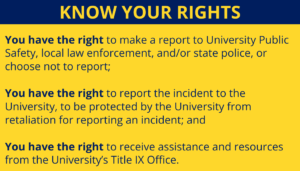
A Guide for Title IX Mandatory Reporting Obligations at the University of Rochester
As part of the University of Rochester community, we all must prioritize ending sexual misconduct and harassment.
All employees, staff, and faculty of the University who do not serve in a Confidential Employee role must notify the Title IX Office or Title IX Coordinator directly when they receive information about conduct that reasonably may constitute Prohibited Conduct as defined in the Title IX Policy, including Retaliation. You must report all known information regarding an incident, including names of individuals.
A disclosure may be direct or indirect; may have occurred on or off-campus and during the University’s programs or activities, or not; and may be an experience prior to enrollment, while on leave, or while an active student.
The following student-employees who receive disclosures while acting in their student-employment capacity are also expected to make a report directly to the Title IX Office:
-
- Residential Life Staff
- All student employees with responsibility for teaching or advising
Follow the recommended steps below when filing out the Online Reporting Form

